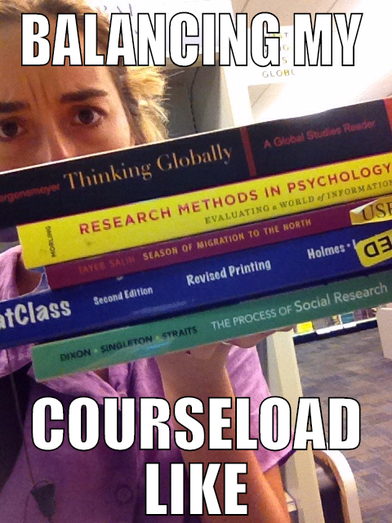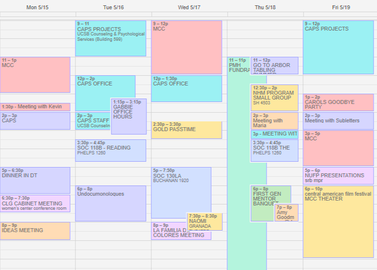This is Way Harder Than I Expected
|
Many STEM students find that the pace and rigor of their courses surprise them and it requires them to really step up their game. Here's some tools to take your academic game to the next level:
|
Balancing Everything on Your Plate
The quarter system moves fast. For each of your classes, you will likely cover in 10 weeks the amount of material that you would have covered over the course of a whole year in high school. On your first day of class you will get your syllabus with the readings, assignments, and exams that you will have throughout the term. There is no warm up period--work begins on Day 1. Before you know it, problem sets will pile up and midterms will creep up on you. The accelerated pace, increased rigor, and looming deadlines requires you to be consistent with studying and use your time efficiently to be able to get it all done.
Here are some tips to tackle all that you have to do with greater ease:
|
- Make time for breaks! On a good day, most students have the capacity for 45 minutes of work before their attention and concentration start to wander. On a tougher day, you might need to take breaks more often. Taking a short 5-10 minute break to grab a snack, take a lap around the library, or just talk to a friend gives your brain time to recharge so that it is more efficient and effective when you refocus on your studying.
- Do the tasks that need more of your brain power earlier in the day when your energy is highest. If you try to do a difficult task when you are tired, you will likely take longer and it will be more challenging to complete the task when you are not operating on a full battery.
Ground Yourself by Establishing Your Weekly Routine
To allocate time for all that you are trying to do--sleeping, eating, class and studying, socializing with friends, regular personal maintenance (e.g., laundry, shopping), extra curricular activities, and work--you need to be organized. Keeping a consistent schedule will help you to know what to expect generally each day and each week and this will help to ground you.
Map out your regular weekly schedule in a planner, a calendar, or your phone. Some students also like to have a big calendar with major events (e.g., exams, breaks) marked on it to make it easier to visualize the whole term. Need some help with planning? Check out our tips as well as visit CLAS for workshops on time management or schedule an individual appointment with a CLAS counselor. Click here to get a blank template to use for your own planning. |
Finding Your Way When Things Feel Overwhelming
|
Navigating the requirements of being a STEM major brings challenges that can sometimes feel overwhelming. Here's a few tips to cope when things feel really challenging:
|
Connect to your Department & Advising
Academic advisors in the College of Letters & Sciences and the College of Engineering are here to guide you in making your academic plan so that you can complete all of your requirements for graduation. They can help you navigate the process of selecting courses, connecting to campus resources that will help you do your best in these courses, and if you are struggling they can help you to evaluate whether to make a change your course load, choose a new academic path, or take time off to reboot and rebuild an academic plan that works best for you. Stop in to meet with an academic advisor and learn how they can help you reach your academic goals. And for more specific guidance within your major, visit your department's advising office. Links to both the college academic advising offices and department specific offices are found below.
College of Letters & Sciences |
Proudly powered by Weebly




